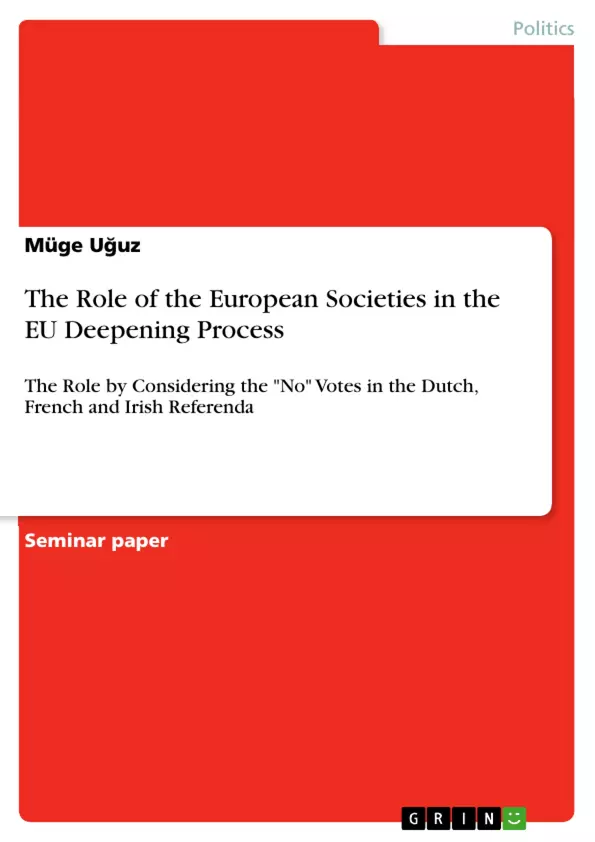One of the important components of the sui-generis character of the European Union is that it is not only an association of member states, but citizens are also recognized as direct parties to the Union. The dual character of the Union, which unites both states and citizens, has a direct effect on the nature of the EU and the decision-making process. Participation, as a key part of the notion of citizenship, is a way to be involved in the ratification process of EU related treaties, and it allows European societies to vote in the referendum regarding declare an opinion about certain issues on behalf of their own country.
In 2005 the Draft Treaty establishing a Constitution for Europe was rejected as a result of the referenda in the Netherlands and France. The Treaty of Lisbon was rejected in Ireland in 2008. The term paper is basically a discussion on the role of the European societies in the EU deepening process by considering the reasons of ‘no’ votes.
Inhaltsverzeichnis (Table of Contents)
- The Role of the European Societies in the EU Deepening Process
- The Rejection of the Treaty that Establishing a Constitution for Europe
- France: Economic Concerns and Domestic Politics
- The Netherlands: Lack of Information, Loss of National Sovereignty, and Cultural Threat
- The Irish Rejection of the Treaty of Lisbon
- Conclusions and Future Prospects
Zielsetzung und Themenschwerpunkte (Objectives and Key Themes)
This article aims to examine the role of European societies in the EU deepening process, focusing on the impact of public opinion on the ratification of EU treaties. It explores the key factors influencing the rejection of the EU Constitutional Treaty in France and the Netherlands, as well as the subsequent rejection of the Treaty of Lisbon in Ireland. The article seeks to understand the interplay between national politics, economic concerns, and social values in shaping public attitudes towards European integration.
- Public Opinion and EU Deepening
- The Impact of Referenda on Integration
- Economic Concerns and Social Values in Shaping Public Attitudes
- The Role of Political Elites in Informing Citizens
- The Relationship between National Identity and European Integration
Zusammenfassung der Kapitel (Chapter Summaries)
- The Role of the European Societies in the EU Deepening Process: This chapter introduces the concept of the EU as a "union of both citizens and states," highlighting the significance of public opinion in the deepening process. It sets the stage for the analysis of specific cases, namely the referenda on the EU Constitutional Treaty in France and the Netherlands.
- The Rejection of the Treaty that Establishing a Constitution for Europe: This chapter analyzes the reasons behind the rejection of the EU Constitutional Treaty in France and the Netherlands. It delves into economic concerns, domestic political trends, loss of national sovereignty, and cultural anxieties that influenced voters' decisions.
- France: Economic Concerns and Domestic Politics: This chapter examines the French referendum, highlighting the role of economic concerns, particularly unemployment, in driving the "no" vote. It also discusses the influence of domestic political dynamics and social anxieties around national identity.
- The Netherlands: Lack of Information, Loss of National Sovereignty, and Cultural Threat: This chapter focuses on the Dutch referendum, emphasizing the lack of information as a key reason for the "no" vote. It explores the concerns surrounding national sovereignty, cultural anxieties, and the potential impact of eastern enlargement on Dutch society.
- The Irish Rejection of the Treaty of Lisbon: This chapter analyzes the Irish referendum on the Treaty of Lisbon, again emphasizing the lack of information as a crucial factor in the rejection. It discusses the concerns surrounding national sovereignty and the potential for political opposition to the EU.
Schlüsselwörter (Keywords)
This work focuses on the role of public opinion in the European Union deepening process, examining the influence of economic concerns, national sovereignty, cultural anxieties, and political elites on referenda outcomes related to EU treaties. Key themes include the impact of referenda on integration, the relationship between national identity and European integration, and the importance of informing citizens about EU policies. The analysis draws on examples from the French, Dutch, and Irish referenda on the EU Constitutional Treaty and the Treaty of Lisbon.
Frequently Asked Questions
Why was the EU Constitutional Treaty rejected in 2005?
The treaty was rejected following "no" votes in referenda in France and the Netherlands, driven by economic concerns, domestic politics, and fears of losing national sovereignty.
What were the main reasons for the "no" vote in France?
French voters were primarily concerned about economic issues, particularly high unemployment, as well as domestic political dynamics and social anxieties regarding national identity.
What influenced the Dutch rejection of the treaty?
Key factors in the Netherlands included a perceived lack of information about the treaty, concerns over the loss of national sovereignty, and cultural threats related to EU enlargement.
Why did Ireland reject the Treaty of Lisbon in 2008?
Similar to other cases, Irish voters cited a lack of clear information, alongside concerns about national sovereignty and political opposition to the EU integration process.
What does the "dual character" of the European Union mean?
The EU is a sui-generis entity that unites both member states and individual citizens as direct parties, making public participation in treaty ratifications crucial.
- Quote paper
- Müge Uğuz (Author), 2020, The Role of the European Societies in the EU Deepening Process, Munich, GRIN Verlag, https://www.grin.com/document/975154



